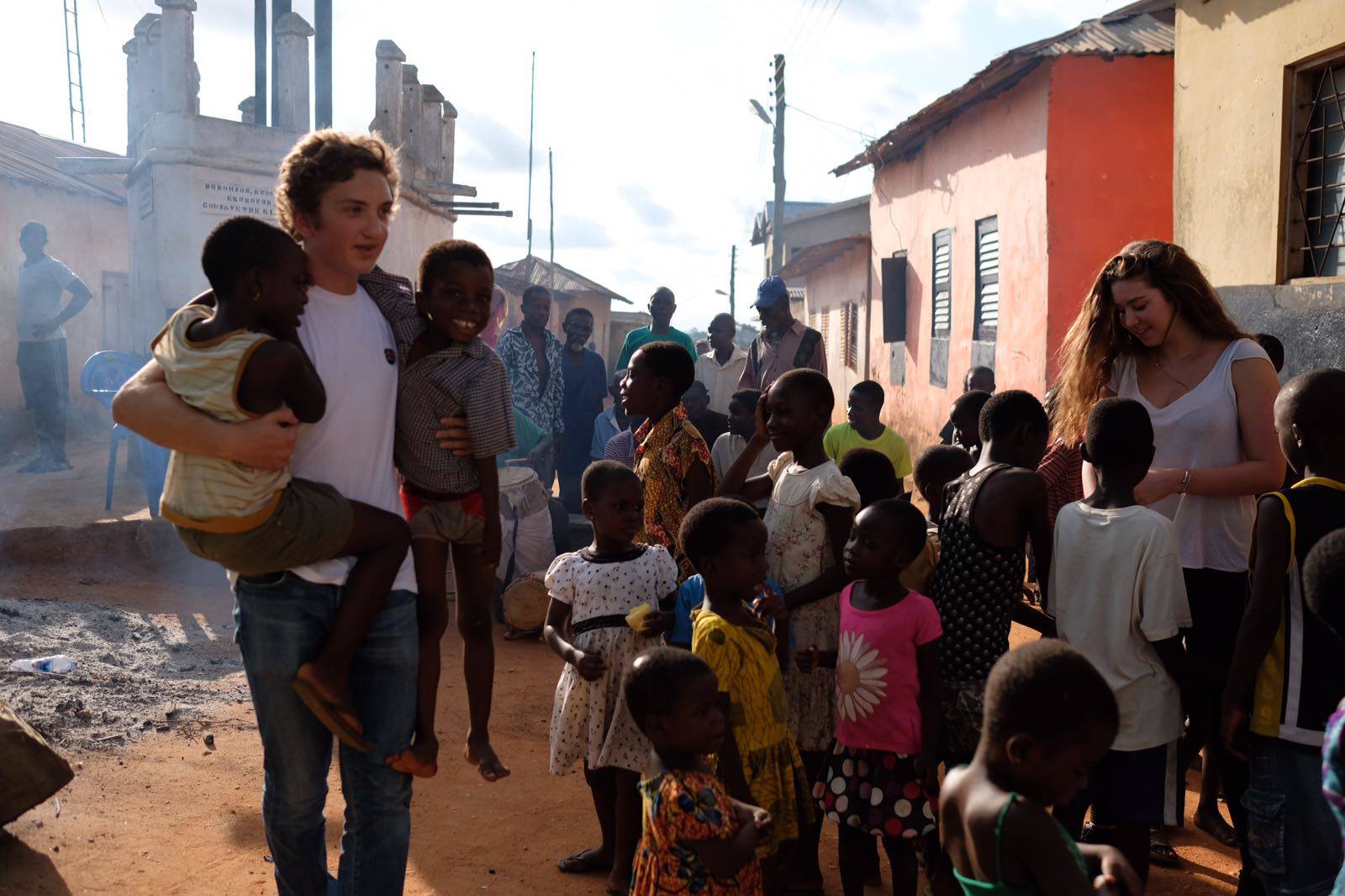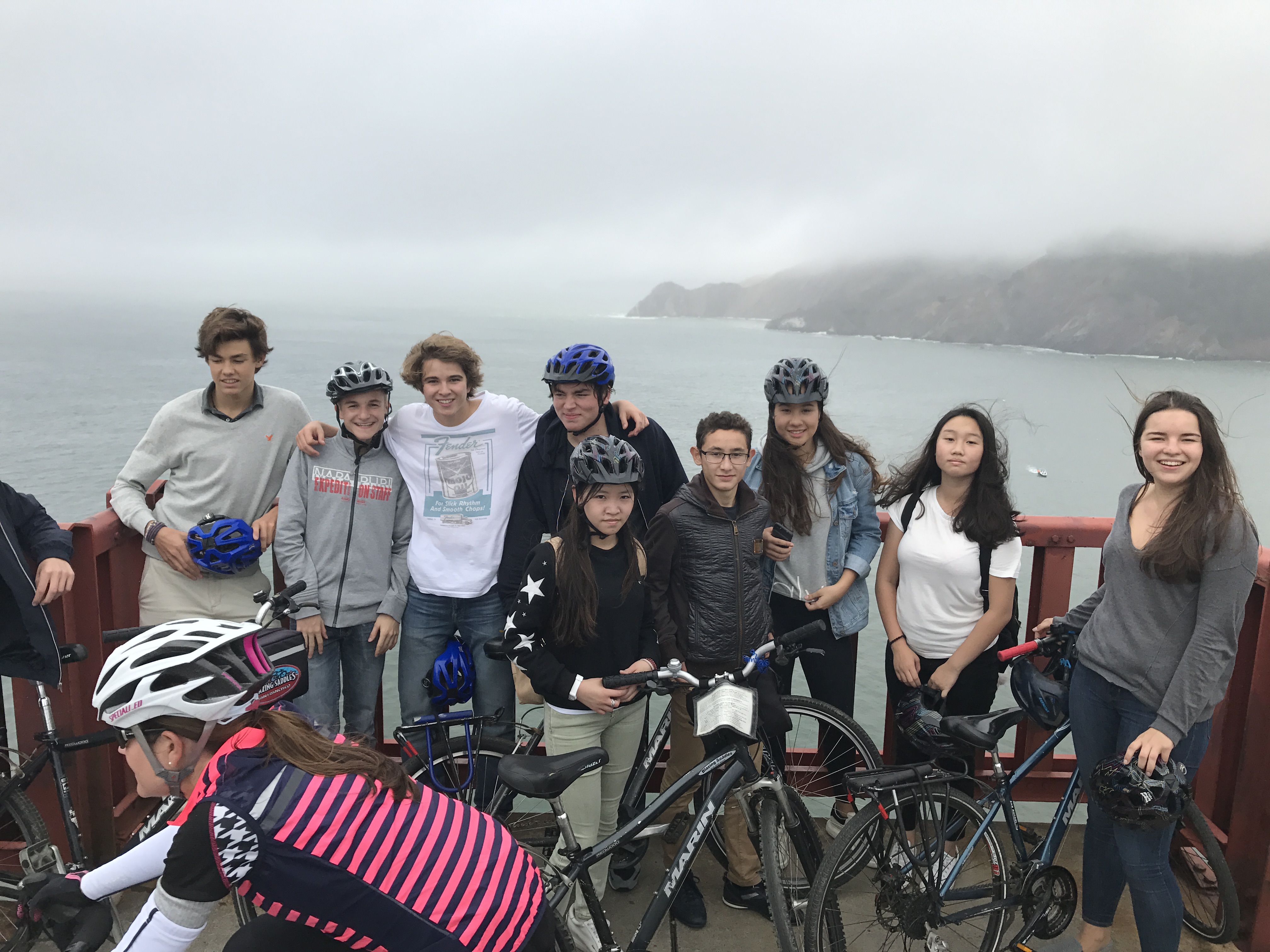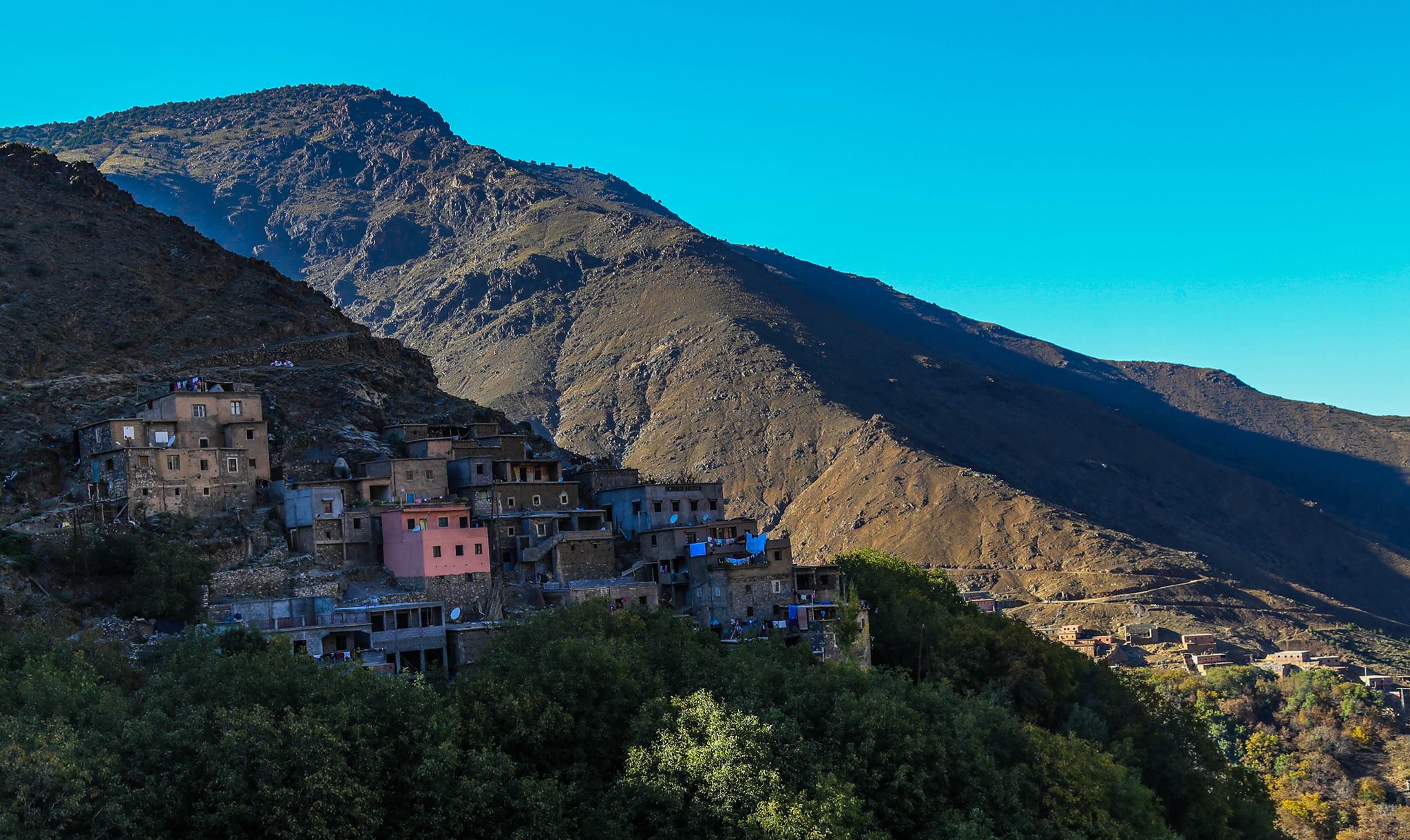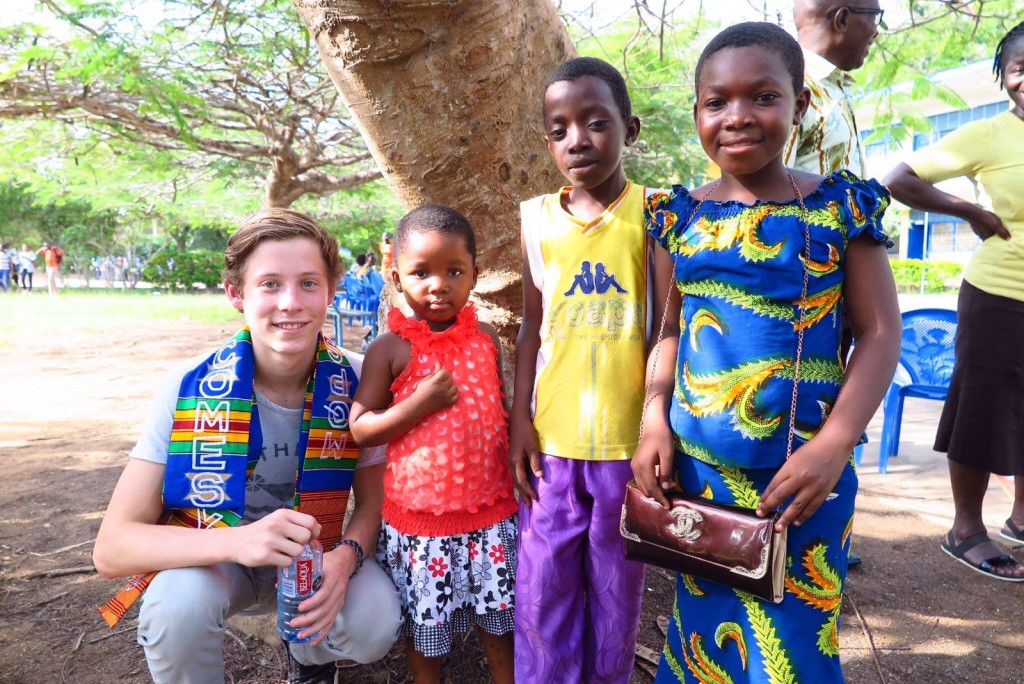Catégorie : Trips
-

Ghana Trip
On the early morning of the Saturday 22nd of October, a group of 11 students and three teachers climbed onto a Taxi Dany bus and set off for their well-prepared trip to help those in need in the distant village of Kokumdu, Accra. Our journey however, had in reality began a month prior to that day, and on the first day upon which we had been recruited into the GT (Ghana Team), we immediately set to work, and over the course of that next month of preparation, had raised our first 1,000 CHF, which we donated as soon as we could to be able to provide schoolbooks and an education fee for three sixteen year-olds from a group of orphaned dancers: AFODAT, whom we would soon come to meet. After having been through several bake sales, and organizational meetings for the trip, as well as a fairly unpleasant trip to the nearby Clinique de Genolier to get our vaccinations for yellow fever, we were finally ready and in perfect form to make the sluggish six hour flight to the capital of Ghana, Accra, and the following five hour bus journey to the village where we would be helping out, Kokumdu. Upon arrival to the biggest city in Ghana, we immediately remarked the very different way of life that was for most of the group, a completely new and refreshing experience. It had felt almost as if we were in a Hollywood movie, with the nonstop shouting all around us as well as offers from strangers to help us and carry our bags to our taxi, while if we looked upwards, we could notice on almost every lamppost and billboard posters campaigning for the presidential candidate Muhama, with various slogans advertising the different ways in which he’d improve the country. We approached the parking lot, and immediately security guards shooed away the crowd of people trying to earn a living near us by still offering to help us with our luggage, and loaded our bags onto the rickety old yellow bus. Straight away, we noticed the truth in the warnings we had received about having to use mosquito spray, as I can recall we must have killed around 15 mosquitoes in that first journey to our hotel, which for that first night was in the city, as we would not make it to Kokumdu by nightfall. Upon arrival to the La Palm Royal Beach Resort, we were all glad to be able to relax for the night in Rosey fashion, perfectly aware of the tiring work that was ahead of us.
At the break of dawn the next day, we loaded our bags onto our new bus, settled in, and plugged in our music for what we thought would be a boring four hour journey to our next destination. It took us by surprise, however, how very different the world was from outside of our tinted bus windows, and at least two hundred pictures must have been taken during the first half of our journey. while we were leaving the city, which has an estimated population of five million people, and realized the density of people living there. On the other side of the looking glass, we could see thousands of people trying to sell each other various trade goods, ranging from what we could only presume were fake Burberry bags and caps, to second-rate phones, to two meter tall piles of socks and various other clothing. We saw women walking around with baskets balanced entirely on their heads, and a man pulling along a medium-size trailer of goods on the side of the dirty, uncemented road. By the time we’d pulled out of the city, after excruciating traffic which led to us being stuck next to construction for an hour, we remarked the largeness of the city, being able to see it stretching for kilometers to either side of us. After seeing some of the beautiful sights that Ghana had to offer, we finally arrived to our new hotel, and immediately ran to the sea, bathing ourselves in the warm waters of the Ivory Coast. We pranced around in the waters, and then went to dry ourselves off, had our first taste of authentic Ghanaian food, and had our first group meeting in Ghana to discuss the duties ahead of us. Over the course of the next day, we conducted interviews at the nearby public school, asking both teachers and students what we could improve, and various other typical humanitarian interviewing questions, and were then treated to a welcoming show by the pupils of the schools, who made us participate in the local dance. The AFODAT group, whom we had helped raise money for earlier in the term, greeted us, and we could see immediately that that money was put to good use, for very talented children. We returned to our home for the week, and were allowed some time to think about the day’s events, and it is then that we realized the crippling poverty in which these children lived, and were immediately convinced that we would have to raise more once we came back. We had a second organizational meeting that night, and discussed ways in which we could improve their quality of life, and what seemed most important for the children, deciding that night that we had three choices: to either buy them proper schoolbooks, whiteboards, or to be able to provide internet for their thirty computers, which had been donated by earlier Roséan groups who had come to the village. Alas, we decided to sleep on it, and decide where our 5,000 CHF that we had as a group only once we had seen all of the different organizations that we could help. Thus, we went to bed, and woke up early the next morning filled with ambition to help, having now seen the terrible conditions in which the locals lived and worked in. So we set off to the nearby Mary Queen of Peace School, a private school for those that could barely afford to pay for school, yet could afford it nevertheless, and thus had slightly better conditions for their children. There were still, however, nearly no whiteboards, very little air conditioning, and a lack of school supplies. We repeated the same interviewing process once we had arrived, and were once again greeted by a special performance by some of the students, as well as a special performance from one of the teachers of one of their local welcoming songs, in which he proclaimed our love for us, as well as missing us, even though we had only just met, nevertheless, we took it in stride and thanked him repeatedly. We then left the school, and went to meet with a local entrepreneur, who proposed to us some of his ideas for a business that would have sold local clothes all over Ghana, based from the local university campus. We discussed his business plan, and offered him some tips to be able to better take advantage of the market, and told him we would get back to him as for if we would fund him or not. We then returned to our hotel, had dinner, and met again to discuss the day’s events; however this meeting would be our first investment meeting, where we were taught by Mr Giovanni as to how to correctly judge investments. We decided that the man’s business plan wasn’t very sustainable nor innovative, and that we probably wouldn’t invest in it, and thus went to bed with a renewed motivation to help. The next day, however, we changed our course, and went to listen to the business plan of a women’s support group, and donated clothes to them, after which we went to a village meeting, where our group leader, Mr Grant, or as he is known in the village, Nana Tenaije the Second, was honored by the chiefs of the village, and made several speeches to the elders of the tribe, after which he proceeded to be involved in several local rituals, all while dressed in traditional Ghanaian chief clothes. We then went back to our hotel, and had a somewhat relaxed evening, the first of our time in the village.
The morning after proved to be tiresome, and we painted a wall at the Mary Queen of Peace School, with designs made by one of our own, Ping-Lin, while also building benches out of bamboo, as per local tradition. We left the school, and left to a nearby castle, which used to be a slaveholding fortress built in the 17th century, while being exchanged several times between various European nations. We returned to the hotel, yet this time talking intensely about exactly who we had to fund, and by what amount, deciding that the Mary Queen of Peace School was our most probable target, as they were lacking a bus, causing their students to have to walk up to four hours each day to get to and fro school, which destroyed their motivation to learn. We were told to hold our decision however, as we still had one more target: the local hospital, which was in dire need of funding for their women’s clinic, which was severely understaffed and required money to be able to fund many of the life-changing surgeries that could not be afforded by the patients. Once we got there, we had a meeting with the board of directors, where Lulu, who had swum the channel in order to raise money for this hospital along with her group, the Chacha team, presented a check for 25,000 CHF to the board. We interviewed the doctors, nurses and some patients, to see if they were truly in as much need as we had heard that they were, and headed back to our hotel. That night, we had the final meeting, and after long debate, it was decided that we would spend 500 CHF on internet for the public school, while the other 4,500 CHF would go towards the funding of the bus, which we were determined to raise the full 50,000 for before the end of the year. Having made a decision, albeit with much debate, we celebrated with a full dinner and a bonfire, while the AFODAT group came and taught us some more of their local dances. We then settled in for the night, packed our bags and got mentally geared to leave. Leaving at 8:00 AM, the bus waited for us in the hotel parking lot, and we regrettably loaded on our bags, and got on. We arrived in Accra several hours later, and headed for the airport. Getting on the plane, we looked behind at our trip with hope, knowing we had, and would continue to, truly make a difference in the lives of these people, and were happy, though exhausted, with the thought. Once back in Rosey, we were happy to finally be able to properly rest, but we still got ready to raise further funds, and still we steel ourselves, holding fundraisers and sold sweaters, raising money to this day, and we hope to achieve our goal of 50,000 CHF before the end of the year.
-Misha
-
Romania Trip
After a seven-hour cramped, bumpy, and tiring bus ride, the small group of about fifteen Class 1 students arrived in the small town of Beius (Romania) our new home for the upcoming week of hard work. We were split up into groups of twos and threes and allocated different houses, staying with host families in their homes. The experience was quite unnerving for all of us to start off with as nobody from the group had stayed in a stranger’s house before. The first four days of the trip were dedicated to long periods of labour, building a house for a family in need with the partnership of Habitat for Humanity Beius. It was an incredible experience, working long hours on the building site, playing football against the local school, and meeting children from the orphanage. Something none of us will forget!

-

Cuvée des Bacheliers
Nous avons eu l’occasion de visiter le Domaine de Chanzy, le 27 au 28 Septembre. Le processus de fabrication du vin rentre très bien dans le cours de Physique-Chimie et SVT du baccalauréat français scientifique, et le vin est un projet intéressant liant notamment ces deux sujets, mais aussi bien d’autres. Chaque année, les classes de Bac Français font un projet sur le vin où ils créent un vin de l’école. Une fois que l’étiquette est choisie parmi les artistes roséens et la démarche terminée, les élèves vendent le vin de Rosey en général aux Classes Terminales qui partent avec un souvenir de leur dernière année roséenne !
-

Silicon Valley
La semaine qui précéda la semaine du break et des voyages humanitaires, fut pour certains une semaine pleins d’éblouissements. Le vendredi 21 jusqu’au vendredi 28, M Gudin et Mme Skevi amenèrent dix élèves du groupe Highest Achievement dans la Silicon Valley ! Le but : comprendre le processus de développement d’une Start-up et ce qui fait de cette région un espace si attractif pour ces nouvelles entreprises.
Durant le weekend, le groupe visita la capitale de la Silicon Valley : San Francisco.
Avec un air de touristes et un vent frais qui parcourait la baie, ils sont passés par le Golden Gate Bridge, la prison d’Alcatraz et bien d’autres endroits. Une fois la ville visitée de long en large, ils ont alors débuté les visites.
Tout d’abord, ils ont pris connaissance du travail d’un Venture Capitalist (investisseurs pour start-ups, ils peuvent investir jusqu’à +20 Millions de dollars). Puis, ce fut la rencontre avec un Serial entrepreneur. Il s’agit d’ une personne qui parvient à enchaîner start-ups après start-ups. C’est dans sa nature et la personne rencontrée était un étudiant de Stanford, Harvard et MIT. Il en était déjà à sa 4ème start-up (toutes liées à la médecine), alors qu’il n’avait environ que 35 ans !!!
Là-bas, ce genre de personnes est plutôt commun, c’est ce qui fait encore une fois de cette baie, une région très spéciale. Puis, au cours de la semaine, ils ont poursuivi leurs visites d’entreprises avec certaines qui valaient des milliards, comme GoogleX (le laboratoire d’idées innovantes de Google) ou Jabil (une compagnie derrière des entreprises comme GoPro ou Apple qui produisent pour eux). Finalement, le dernier jour, ils ont visité près de cinq start-ups qui se concentraient sur des produits technologiques permettant de rendre les bâtiments plus connectés au monde Tech. En parallèle de ces visites, le groupe s’est divisé en trois et chacun a travaillé de son côté pour imaginer et programmer le développement d’une application qui n’existe pas dans le monde. Cette activité a pu donner aux élèves un avant-goût des processus à envisager avant de lancer une entreprise. Donc c’est avec enthousiasme à chaque visite, accompagné par tant d’innovation, que les élèves ont pu comprendre pourquoi cette région est si attractive et perçue mondialement comme une référence et un ‘paradis’ pour start-ups.
Les élèves ont été plus que réjouis de ce voyage car ils ont découvert un nouveau monde qu’ils ignoraient jusqu’à présent. Et qui sait, peut-être que l’un d’eux y retournera pour créer sa start-up ?… Deviendra-t-elle le prochain Apple ou Google ? à suivre…
Alexandre Mourot
-
Le Rosey Abantara- Mali
Pendant la semaine des voyages de mi-trimestre, trois professeurs se sont rendus à Bamako pour rendre visite à leurs collègues maliens et évaluer la situation de l’école.
Celle-ci est actuellement pleine avec 1450 élèves répartis dans les 4 sections, jardin d’enfants, primaire, collège et lycée.
Les résultats au baccalauréat se sont encore améliorés cette année. Notre taux de réussite est de 58,4% alors que le taux national est de 17,99%. Une de nos élèves est arrivée première en section littéraire et a obtenu du gouvernement une bourse pour étudier dans une université marocaine.
Nous avons cette année 100 boursiers qui reçoivent gratuitement l’éducation, les transports domicile-école-domicile, le repas de midi, l’uniforme et les fournitures scolaires. La bourse est de 1000Frs pour l’année scolaire. Ils sont très motivés et obtiennent les meilleurs résultats dans tous les domaines. Notre souhait est évidemment d’augmenter régulièrement ce nombre d’élèves choisis dans des écoles publiques où ils sont souvent plus de 100 par classe !
Depuis 2014, la direction a développé les branches artistiques: musique, théâtre, arts graphiques ont suscité un grand intérêt chez les étudiants qui se produisent régulièrement sur la scène du théâtre.
Le terrain multi-sport connaît également un grand succès : football, basketball, volleyball, athlétisme.
La bibliothèque s’est modernisée et est maintenant complètement informatisée avec un logiciel de gestion de la bibliothèque nationale du Mali.
Nous disposons depuis cette année de 3 salles d’informatique avec 54 PC. Chaque année nous apportons de nouveaux ordinateurs portables à l’intention des professeurs pour la préparation des cours.
Le jardin d’enfants « Anne Gudin » est réparti sur 3 sections et compte cette année 94 bambins de 3 à 6 ans.
Ils disposent d’un terrain de jeux où ils passent une partie de la matinée.
350 repas sont servis chaque jour pour les demi-pensionnaires qui restent à l’école entre 12h à 15h.
Les cours ont lieu de 8h à 12h et de 15h à 17h.
Les élèves arrivent à l’école à 7h45, chantent l’hymne national et lèvent les drapeaux du Mali et de l’école avant d’entrer en classe.
-

Morocco Humanitarian Trip
The possibilities women have in Arabic countries in comparison to men has been progressing rapidly due to the realization that without the input of half of the population no country can improve.
Many families do not have the ability to pay for their children to go to school in morocco. However, the creation of an organization called Education for All has lead to the free possibility of education for girls, a small step in Morocco but a possible leap in global change.
Students of Rosey were sent to Morocco on a mission to learn about the lives of these girls, teach them different ways to learn, show them fun activities, give them something to remember and to make sure that all the money they would receive would be going to a trustworthy organization. To see the opportunity these unlucky intelligent and creative girls are given is amazing, however there are simply 5 houses that can give these girls education due to the difficulty in building more houses of education. In these houses these girls are given shelter, food, parenting and even education thanks to the wonderful work of education for all. It is unimaginable how lucky we are compared to such a great number of people. It is our duty in this world to use what we have and give it to our society. Therefore, with great confidence education for all is definitely an organization that should be supported by the members of Le Rosey. The students who went to Morocco learnt that with an idea and reason to back it up anything can happen, and with support small organizations such as this can idealistically spread all over the world.
Education is the key to solving all the problems in our world today and the key to improving our world as a whole. Therefore, it should be clear that it should be one of our missions as the able to aim to improve global education, small places like this are where big changes occur.
On a funnier note, the students came back with oddly large legs. 300km of cycling down and up hill is definitely not easy but the beauty of the Moroccan weather and landscape eased up on the tiring legs. The ability to cycle on the amazing Atlas Mountains was an excellent experience as the view was out of this world with valleys, mountains, snow, sun, dessert, ruin, buildings, farmers, mules and many more exciting sites.
Furthermore, Morocco is not just poverty and beauty; it is an economically happening place. The students on the Morocco trip were able to visit the square in Marrakech, probably the most happening and hectic square in this world. The amount of shops, sellers and shows happening in the square is uncountable. Money just keeps moving from hand to hand as it is as simple as taking pictures that can make you open your wallet. However, on a more beneficial note bargaining is possible nearly everywhere in the square as every student tested their bargaining skills and by the last day were even able to buy items for half the initial price.
The trip was all-rounded, with a portion of it helping girls in need, cycling, shopping and seeing beautiful Morocco. Therefore, it is definitely the humanitarian trip to sign up for. Undoubtedly and in all honesty no matter who goes with you it will be one of the greatest experiences in your lives.
By Faisal
-
Japan Trip
By Fares






